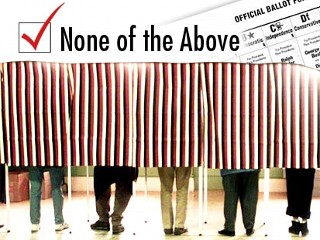they are convinced that all politicians are crooks and buffoons, and therefore don’t want to associate themselves with any of them. I try to explain that this is rarely the case with the scrupulous, principled and wise Republican Party, only the monopolistic, corrupt, spoiled, disingenuous, unrestrained spenders in the Democrat-Socialist Party, but they won’t have it.Initially, I thought this statement was meant ironically, it reads like something a Stephen Colbert might say, but Miller's position in the GOP bureaucracy speaks against that idea. Of course, for the most part, anyone who begins from the assumption that politicians are crooks or buffoons is not as far off the mark of truth as one who believes the opposite, even more so when the latter is only capable of recognizing corruption and buffoonery when the pig or clown in question is a member of a party other than their own. Unsurprisingly, Miller does not consider the possibility that the unaffiliated voter's stance is based upon a reflective critique of the two-party system itself, or of party politics in general. In an analysis of the development of the military-industrial complex since Eisenhower's farewell speech warning against undue influence from that sector, Henry Pelifian writes at Dissident Voice:
Now, more than ever, the focus ought to be on the two party system which together have wrought the current multi-trillion dollar bailout, the savings and loan scandal of the 1980s, the fiasco of the Vietnam and Iraq wars and the utter waste of tens of billions of dollars in government programs on an annual basis for several generations. Often, the two party system prevents accountability in government because it will have adverse effects on future elections. The two parties have embarked on a foreign policy that is skewed by constantly playing favorites with foreign and military aid that is harming the interests of the American people by unnecessarily creating adversaries in our interventionist policies.In an article examining 'the deeper origins of the economic crisis,' Shamus Cooke notes the role played by the duopoly parties in facilitating the fiasco:
Not only were average people encouraged to take on large amounts of debt by corporations and governments alike, they needed the extra money to compensate for their stagnant or falling wages. The delusion that such an obvious pyramid scheme could go on forever was shared by virtually every member of the U.S. two-party system. It is hard to fathom a bigger indictment of stupidity and greed.Granted, these comments are drawn from left-wing sources, but similar statements on the deleterious effects of the two-party state on the body politic are often made by conservative and right-leaning commentators, which demonstrates the extent to which discontent with the duopoly system is not confined to a small slice of the political spectrum.
Finally, Miller continues: "The irony is that their desire to label themselves independent free-thinkers has the result of disenfranchising them in the primary election." This is a backward and highly misleading formulation. Independents do not disenfranchise themselves by eschewing affiliation with a party, rather the parties disenfranchise them by prohibiting anyone but registered partisans from voting in their primar
 ies, as is their right. The question remains, however, as to why unaffiliated voters do not therefore register with a third party which is more in line with their thinking than either of the duopoly parties. There are likely numerous explanations for this phenomenon. Perhaps they find that no third party offers a platform which more closely approximates their views. Perhaps, despite their independent affiliation, they have not yet liberated themselves from the ideology of the duopoly and thus continue to fall prey to the various duopolist arguments against third party affiliation. Perhaps they are mere swing voters and hence not true independents. And maybe they are just independent independents.
ies, as is their right. The question remains, however, as to why unaffiliated voters do not therefore register with a third party which is more in line with their thinking than either of the duopoly parties. There are likely numerous explanations for this phenomenon. Perhaps they find that no third party offers a platform which more closely approximates their views. Perhaps, despite their independent affiliation, they have not yet liberated themselves from the ideology of the duopoly and thus continue to fall prey to the various duopolist arguments against third party affiliation. Perhaps they are mere swing voters and hence not true independents. And maybe they are just independent independents.







2 comments:
Could the dependence of all parties on platforms be part of the problem, as far as the unaffiliated are concerned? It might not be that third parties don't offer a perfect match of independents' views, but that they require voters to buy into an entire package of views that individuals might find contradictory or irrelevant. The perceived imperative of building independent parties may be getting in the way of the advancement of genuinely independent candidates.
I agree and think that is indeed part of the problem. Unwieldy party platforms often seem to rest on the false assumption that this one group magically has all the answers to all our problems. One issue, if it is important enough to a given individual, can turn him or her away from a group even though they agree with 90% of the rest of the platform. That's one reason why I was intrigued with the idea of a party that takes no positions on any issues, as I mentioned the other day. I think though that building organizational apparatuses that are independent of the duopoly networks is important to do in order to support independent candidates. And parties are only one form of such organizations among many.
Post a Comment